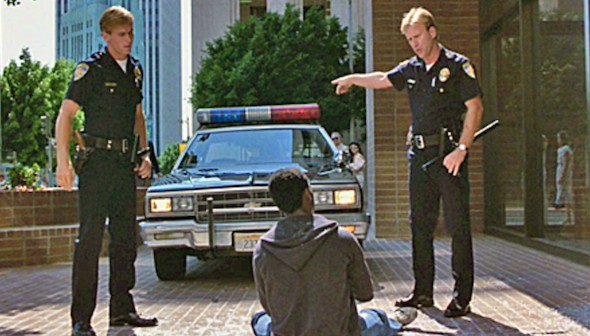
What can happen when a citizen films police or parking control officers?
For Stephen Jermaine Barnes on July 4, 2012, at Anaheim's Peralta Park for a Fourth of July fireworks show, the answer was pain, punishment and loss of liberty.
Barnes temporarily parked his Ford Taurus, emerged on foot to ask an officer where he could park and took out his cell phone to visually record the traffic congestion.
But the perfectly legal filming apparently didn't delight the city's public servants and backup units, including officer Brian Snowden, arrived.
Snowden officially decided Barnes' conduct had been “belligerent,” according to a police report.
]
The officer entered the man's car without a warrant, saw a small cup with alcohol and grabbed two, small gardening tools, props the cop would later use to threaten filing concealed weapons charges.
Though he hadn't observed the suspect driving, Snowden placed Barnes under arrest for DUI and double locked him in handcuffs, a move that caused scarring and immense pain.
In Oct. 2013, Orange County prosecutors asked a jury to uphold Snowden's charges, but the citizen's panel refused based on a lack of supportive evidence, and Barnes sued the officer and the Anaheim Police Department (APD) for false arrest.
The lawsuit accused the officer of falsifying his report to include a lie: that Barnes had admitted to driving while intoxicated.
Backing Snowden's conduct as professional, lawyers for the APD initially responded to the lawsuit by claiming Barnes' blood-alcohol level had been over .1 percent at the scene.
Late this month, however, U.S. District Court Judge Josephine L. Staton formally dismissed the civil case and its planned five-day, 2015 trial after both sides emerged from a mediation in Los Angeles with a settlement.
Terms of the deal were not included in the federal case file.
Law enforcement officials in California have conceded for years that citizens are legally authorized to film police as long as they don't get too close or hamper an officer's ability to perform duties.
Reason.com has published “7 Rules for Recording Police,” an article you can read HERE.
Follow OC Weekly on Twitter @ocweekly or on Facebook!
Email: rs**********@oc******.com. Twitter: @RScottMoxley.

CNN-featured investigative reporter R. Scott Moxley has won Journalist of the Year honors at the Los Angeles Press Club; been named Distinguished Journalist of the Year by the LA Society of Professional Journalists; obtained one of the last exclusive prison interviews with Charles Manson disciple Susan Atkins; won inclusion in Jeffrey Toobin’s The Best American Crime Reporting for his coverage of a white supremacist’s senseless murder of a beloved Vietnamese refugee; launched multi-year probes that resulted in the FBI arrests and convictions of the top three ranking members of the Orange County Sheriff’s Department; and gained praise from New York Times Magazine writers for his “herculean job” exposing entrenched Southern California law enforcement corruption.

